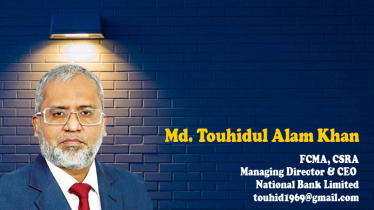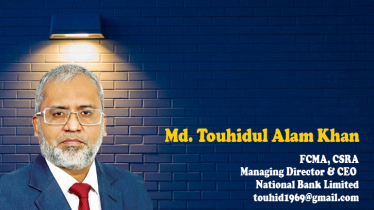
Photo : TDM
The Western world has long been regarded as a moral leader, setting a model for other countries and cultures to emulate. This is due to the unprecedented progress of society in terms of democracy, freedom, ethics, morality, politics, economics, and the social sphere. The West has been associated with the industrial revolution, intellectual development, and social Renaissance for many years. Many non-western countries around the world have followed the moral leadership of the West to some extent in recent decades. However, as the West continues to succumb to the temptations of materialism, consumerism, and self-indulgence, this moral leadership has steadily declined in recent years. This is a concerning trend that could have severe ramifications for both the West and the global community.
An increasingly individualistic worldview that prioritises personal gain over any collective good is at the root of this decline in moral leadership. It is all too common in today's Western societies to see people putting their needs ahead of those of the community or even their families. This can be seen in various ways, ranging from rising debt levels among citizens due to excessive spending habits to dwindling empathy for others as we become more isolated and disconnected from our communities. It also manifests in disregarding fundamental ethical principles such as honesty and integrity, which increasingly become casualties of our desire for instant gratification. This disregard for moral norms can have far-reaching consequences in our interpersonal relationships and our ability to find long-term solutions to global problems such as climate change and poverty alleviation.
Furthermore, there is a growing perception that many Western governments fail to meet their moral obligations when providing aid and assistance to developing countries or addressing global human rights issues. Many governments appear to be preoccupied with national interests rather than taking a broader view of international affairs, which would go some way toward restoring Western confidence in global leadership. Most importantly, due to the colonial mindset, Western foreign policy is becoming more hegemonic, one-sided, and unipolar rather than multipolar and equal. The Western world believes it is superior and has the authority to preach to others about democracy, freedom, territorial integrity, equality, ethics, and free speech.
The lack of moral leadership in the West is a pressing global issue. Political leaders have increasingly prioritised short-term gains and profits over long-term solutions that benefit society. In international politics and the social sphere, this lack of moral leadership has resulted in increased inequality and the erosion of core values such as fairness, justice, compassion, and responsibility. But why is this so? We must all look for the underlying causes of Western hegemony and leadership crises to gain insight. We must also comprehend what moral leadership entails.Moral leadership refers to an individual or group's ability to lead with integrity and strong ethical values.
It involves leading by example, promoting fairness and justice, and inspiring others to do their best. Moral leaders possess several key characteristics that aid them in leading others and ensuring everyone involved has the same level of respect for one another. The first essential quality of moral leadership is integrity. Ethical leaders must always remain true to their beliefs and values, regardless of what others think or say. They should never exploit anyone else trust or loyalty for personal gain but should act with respect for their colleagues and those they lead. This includes being truthful when discussing complex topics such as finances, job performance, policies, and so on, rather than sugarcoating it to make someone feel better about the situation.
Empathy is another essential characteristic of moral leadership. An ethical leader should be able to recognise how others are feeling in any given situation and offer assistance where necessary. This includes understanding when mistakes occur, offering encouragement during difficult times, carefully listening to all parties involved before making a decision, and not taking sides based solely on personal opinion but instead looking at the facts objectively. Furthermore, showing compassion to everyone involved can help build trust among team members and create a positive environment in which everyone feels respected and valued for their contributions. Finally, moral leaders should speak confidently without coming across as aggressive or intimidating while still effectively conveying their message; be patient while carefully listening to what others have to say; avoid jumping to conclusions too quickly, actively engage with team members by asking questions; summarising conversations regularly, providing constructive feedback whenever necessary and expressing appreciation whenever deserved so that all team members feel appreciated.
This deficit can be traced back to the fourth phase of current globalisation, which began in the 1990s. When the Soviet Union disintegrated, it marked one of the most seismic eras in political history. The West has been waiting a long time for this to happen. During this period, governments worldwide adopted economic policies prioritising deregulation and privatisation over public investment. These policies fostered an environment where corporations could operate with little oversight and accountability, resulting in corporate greed, corruption, and exploitation. As a result, there was a growing disparity between those at the top who benefited from these policies and those at the bottom who were left behind with few or no opportunities for advancement.
The lack of moral leadership has also increased polarisation within the home and abroad societies. Right-wing populists have exploited this schism to blame immigrants or minorities for problems caused by years of failed economic policies pursued by elites in their countries. At the same time, religious fundamentalism has grown as people seek solace in traditional values as their prospects under global capitalism become more uncertain. But, in the end, it is up to all citizens to hold our leaders accountable if we want to see real progress on issues like poverty reduction or climate change mitigation strategies that benefit everyone in society, regardless of race or class. We must demand greater transparency from our elected officials to ensure they act in our collective interests rather than advancing narrow agendas that benefit those at the top of society's hierarchy.
The war in Ukraine is a tragic example of Western leadership's lack of moral foresight. For more than eight years, Ukraine has been wracked by violence and conflict due to the actions of external forces, most notably Western arrogance and NATO's eastward expansionism. The war has resulted in thousands of deaths and millions of refugees on both sides, highlighting Western leaders' failure to exercise moral wisdom in international affairs. Despite numerous attempts at negotiations, no peace agreement has been reached between the two sides since the recent conflict began last February. Western powers are more likely to prolong the war to punish Russia.
Moral leadership and wisdom also assist us in understanding that there are no winners in war. Only losers suffer enormous hardship and pain due to its consequences. This realisation emphasises the importance of a peaceful resolution over the continuation of violence and destruction. We must remember that all lives, regardless of political affiliations or nationalities, are valuable and that any solution must prioritise human well-being over other objectives. Moral wisdom encourages us to approach peace with compassion and understanding rather than fear or hatred. It teaches us that even when tensions between two countries are high, there are still opportunities for dialogue and collaboration if we are willing to look beyond our differences and focus on shared goals. It encourages us not to give up hope when things appear hopeless, but to strive for harmony, as it provides a much more promising future for everyone involved in this conflict—both those living in Ukraine now and future generations yet unborn, who will have no choice but to live with whatever legacy this war leaves them behind unless something changes now. But, ultimately, if we want to reclaim our position as moral leaders, we must first look at ourselves—individually and collectively—and ask what kind of world we want. Do we want one where money is the king, or social justice reigns supreme? It is up to us, citizens and political leaders alike, to decide what kind of future we will build together through our decisions today. Only then can we reclaim our lost moral leadership within the global community.
The Writer is Educator, author, and researcher, Senior lecturer, Regent College London, UK








